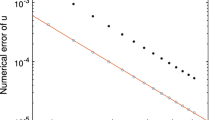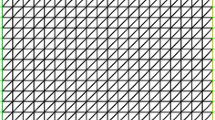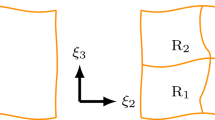Abstract
For the discretization of the convective term in the Navier–Stokes equations, the commonly used convective formulation (CONV) does not preserve kinetic energy if the divergence constraint is only discretely enforced. In this paper, we apply the skew-symmetrization technique in Cockburn et al. (Math Comput 74(251):1067–1095, 2005. https://doi.org/10.1090/S0025-5718-04-01718-1) to conforming finite element methods, which restores energy conservation for CONV. The main idea is to replace the discrete advective velocity with an \(H({\text {div}})\)-conforming divergence-free one in CONV. We prove that the modified convective formulation also conserves linear momentum, helicity, 2D enstrophy and total vorticity under some appropriate senses. The popular CNLE (linearly extrapolated Crank–Nicolson) method also conserves them when this modified formulation is used. Under the assumption \(\varvec{u}\in L^{2}(0,T;\varvec{W}^{1,\infty }(\Omega )),\) it can be shown that the Gronwall constant does not explicitly depend on the Reynolds number in the error estimates. Numerical experiments show that the linearized and modified convective formulation has similar performance with the EMAC formulation and outperforms the usual skew-symmetric formulation (SKEW).











Similar content being viewed by others
Data Availability
All data generated or analysed during this study are included in this manuscript. Partial work was completed during the first author’s visit at Weierstrass Institute, 10117 Berlin, Germany.
References
Evans, J.A., Hughes, T.J.R.: Isogeometric divergence-conforming B-splines for the unsteady Navier-Stokes equations. J. Comput. Phys. 241, 141–167 (2013). https://doi.org/10.1016/j.jcp.2013.01.006
Charnyi, S., Heister, T., Olshanskii, M.A., Rebholz, L.G.: On conservation laws of Navier–Stokes Galerkin discretizations. J. Comput. Phys. 337, 289–308 (2017). https://doi.org/10.1016/j.jcp.2017.02.039
Arakawa, A.: Computational design for long-term numerical integration of the equations of fluid motion: two dimensional incompressible flow. Part I. J. Comput. Phys. 1, 119–143 (1966). https://doi.org/10.1016/0021-9991(66)90015-5
Fix, G.J.: Finite element models for ocean circulation problems. SIAM J. Appl. Math. 29(3), 371–387 (1975). https://doi.org/10.1137/0129031
Abramov, R.V., Majda, A.J.: Discrete approximations with additional conserved quantities: deterministic and statistical behavior. Methods Appl. Anal. 10(2), 151–190 (2003). https://doi.org/10.4310/MAA.2003.v10.n2.a1
Rebholz, L.G.: An energy- and helicity-conserving finite element scheme for the Navier–Stokes equations. SIAM J. Numer. Anal. 45(4), 1622–1638 (2007). https://doi.org/10.1137/060651227
Palha, A., Gerritsma, M.: A mass, energy, enstrophy and vorticity conserving (MEEVC) mimetic spectral element discretization for the 2D incompressible Navier-Stokes equations. J. Comput. Phys. 328, 200–220 (2017). https://doi.org/10.1016/j.jcp.2016.10.009
Olshanskii, M.A., Rebholz, L.G.: Longer time accuracy for incompressible Navier–Stokes simulations with the EMAC formulation. Comput. Methods Appl. Mech. Engrg. 372, 113369 (2020). https://doi.org/10.1016/j.cma.2020.113369
John, V., Linke, A., Merdon, C., Neilan, M., Rebholz, L.G.: On the divergence constraint in mixed finite element methods for incompressible flows. SIAM Rev. 59(3), 492–544 (2017). https://doi.org/10.1137/15M1047696
Pastrana, D., Cajas, J.C., Lehmkuhl, O., Rodríguez, I., Houzeaux, G.: Large-eddy simulations of the vortex-induced vibration of a low mass ratio two-degree-of-freedom circular cylinder at subcritical reynolds numbers. Comput. Fluids 173, 118–132 (2018). https://doi.org/10.1016/j.compfluid.2018.03.016
Lehmkuhl, O., Houzeaux, G., Owen, H., Chrysokentis, G., Rodriguez, I.: A low-dissipation finite element scheme for scale resolving simulations of turbulent flows. J. Comput. Phys. 390, 51–65 (2019). https://doi.org/10.1016/j.jcp.2019.04.004
Owen, H., Chrysokentis, G., Avila, M., Mira, D., Houzeaux, G., Borrell, R., Cajas, J.C., Lehmkuhl, O.: Wall-modeled large-eddy simulation in a finite element framework. Int. J. Numer. Methods Fluids 92(1), 20–37 (2020). https://doi.org/10.1002/fld.4770
Ingram, R.: A new linearly extrapolated Crank-Nicolson time-stepping scheme for the Navier–Stokes equations. Math. Comput. 82(284), 1953–1973 (2013). https://doi.org/10.1090/S0025-5718-2013-02678-6
Layton, W., Manica, C.C., Neda, M., Rebholz, L.G.: Numerical analysis and computational testing of a high accuracy Leray-deconvolution model of turbulence. Numer. Methods Part. Differe. Eq. 24(2), 555–582 (2008). https://doi.org/10.1002/num.20281
Labovsky, A., Layton, W.J., Manica, C.C., Neda, M., Rebholz, L.G.: The stabilized extrapolated trapezoidal finite-element method for the Navier–Stokes equations. Comput. Methods Appl. Mech. Engrg. 198(9), 958–974 (2009). https://doi.org/10.1016/j.cma.2008.11.004
He, Y., Sun, W.: Stabilized finite element method based on the Crank-Nicolson extrapolation scheme for the time-dependent Navier–Stokes equations. Math. Comp. 76(257), 115–137 (2007). https://doi.org/10.1090/S0025-5718-06-01886-2
Charnyi, S., Heister, T., Olshanskii, M.A., Rebholz, L.G.: Efficient discretizations for the EMAC formulation of the incompressible Navier–Stokes equations. Appl. Numer. Math. 141, 220–233 (2019). https://doi.org/10.1016/j.apnum.2018.11.013
Cockburn, B., Kanschat, G., Schötzau, D.: A locally conservative LDG method for the incompressible Navier–Stokes equations. Math. Comput. 74(251), 1067–1095 (2005). https://doi.org/10.1090/S0025-5718-04-01718-1
Guzmán, J., Shu, C.-W., Sequeira, F.A.: H(div) conforming and DG methods for incompressible Euler’s equations. IMA J. Numer. Anal. 37, 1733–1771 (2017). https://doi.org/10.1093/imanum/drw054
Lederer, P.L., Lehrenfeld, C., Schöberl, J.: Hybrid discontinuous Galerkin methods with relaxed H(div)-conformity for incompressible flows. Part II. ESAIM Math. Model. Numer. Anal. 53(2), 503–522 (2019). https://doi.org/10.1051/m2an/2018054
Matthies, G., Tobiska, L.: Mass conservation of finite element methods for coupled flow-transport problems. Int. J. Comput. Sci. Math. 1(2/3/4), 293 (2007). https://doi.org/10.1504/IJCSM.2007.016537
Gmeiner, B., Waluga, C., Wohlmuth, B.: Local mass-corrections for continuous pressure approximations of incompressible flow. SIAM J. Numer. Anal. 52(6), 2931–2956 (2014). https://doi.org/10.1137/140959675
Linke, A.: On the role of the Helmholtz decomposition in mixed methods for incompressible flows and a new variational crime. Comput. Methods Appl. Mech. Engrg. 268, 782–800 (2014). https://doi.org/10.1016/j.cma.2013.10.011
Linke, A., Matthies, G., Tobiska, L.: Robust arbitrary order mixed finite element methods for the incompressible Stokes equations with pressure independent velocity errors. ESAIM Math. Model. Numer. Anal. 50(1), 289–309 (2016). https://doi.org/10.1051/m2an/2015044
Lederer, P.L., Linke, A., Merdon, C., Schöberl, J.: Divergence-free reconstruction operators for pressure-robust Stokes discretizations with continuous pressure finite elements. SIAM J. Numer. Anal. 55(3), 1291–1314 (2017). https://doi.org/10.1137/16M1089964
Allendes, A., Barrenechea, G.R., Naranjo, C.: A divergence-free low-order stabilized finite element method for a generalized steady state Boussinesq problem. Comput. Methods Appl. Mech. Engrg. 340, 90–120 (2018). https://doi.org/10.1016/j.cma.2018.05.020
Allendes, A., Barrenechea, G.R., Novo, J.: A divergence-free stabilized finite element method for the evolutionary Navier-Stokes equations. SIAM J. Sci. Comput. 43(6), 3809–3836 (2021). https://doi.org/10.1137/21M1394709
García-Archilla, B., John, V., Novo, J.: On the convergence order of the finite element error in the kinetic energy for high Reynolds number incompressible flows. Comput. Methods Appl. Mech. Engrg. 385, 114032 (2021). https://doi.org/10.1016/j.cma.2021.114032
Schroeder, P.W., Lehrenfeld, C., Linke, A., Lube, G.: Towards computable flows and robust estimates for inf-sup stable FEM applied to the time-dependent incompressible Navier-Stokes equations. SeMA 75(4), 629–653 (2018). https://doi.org/10.1007/s40324-018-0157-1
John, V., Knobloch, P., Novo, J.: Finite elements for scalar convection-dominated equations and incompressible flow problems: a never ending story? Comput. Visual Sci. 19(5–6), 47–63 (2018). https://doi.org/10.1007/s00791-018-0290-5
Bernardi, C., Raugel, G.: Analysis of some finite elements for the Stokes problem. Math. Comp. 44(169), 71–79 (1985). https://doi.org/10.2307/2007793
Girault, V., Raviart, P.-A.: Finite element methods for Navier–Stokes equations. Springer series in computational mathematics, vol. 5. Springer, Berlin (1986). https://doi.org/10.1007/978-3-642-61623-5
Boffi, D., Brezzi, F., Fortin, M.: Mixed finite element methods and applications. Springer Series in Computational Mathematics, vol. 44. Springer, Heidelberg (2013). https://doi.org/10.1007/978-3-642-36519-5
Olshanskii, M., Rebholz, L.G.: Note on helicity balance of the Galerkin method for the 3D Navier–Stokes equations. Comput. Methods Appl. Mech. Eng. 199(17), 1032–1035 (2010). https://doi.org/10.1016/j.cma.2009.11.015
Girault, V., Nochetto, R.H., Scott, L.R.: Max-norm estimates for Stokes and Navier–Stokes approximations in convex polyhedra. Numer. Math. 131(4), 771–822 (2015). https://doi.org/10.1007/s00211-015-0707-8
Olshanskii, M.A.: A low order Galerkin finite element method for the Navier–Stokes equations of steady incompressible flow: a stabilization issue and iterative methods. Comput. Methods Appl. Mech. Engrg. 191(47), 5515–5536 (2002). https://doi.org/10.1016/S0045-7825(02)00513-3
Olshanskii, M.A., Reusken, A.: Grad-div stabilization for Stokes equations. Math. Comput. 73, 1699–1718 (2004). https://doi.org/10.1090/S0025-5718-03-01629-6
de Frutos, J., García-Archilla, B., John, V., Novo, J.: Analysis of the grad-div stabilization for the time-dependent Navier–Stokes equations with inf-sup stable finite elements. Adv. Comput. Math. 44(1), 195–225 (2018). https://doi.org/10.1007/s10444-017-9540-1
John, V., Li, X., Merdon, C., Rui, H.: Inf-sup stabilized Scott–Vogelius pairs on general simplicial grids by Raviart–Thomas enrichment. arXiv: 2206.01242 (2022). https://doi.org/10.48550/ARXIV.2206.01242
Li, Xu., Rui, H.: An EMA-conserving, pressure-robust and Re-semi-robust method with a robust reconstruction method for Navier-Stokes. ESAIM Math. Model. Numer. Anal. 57(2), 467–490 (2023). https://doi.org/10.1051/m2an/2022093
Linke, A., Merdon, C.: Pressure-robustness and discrete Helmholtz projectors in mixed finite element methods for the incompressible Navier-Stokes equations. Comput. Methods Appl. Mech. Engrg. 311, 304–326 (2016). https://doi.org/10.1016/j.cma.2016.08.018
Li, X., Rui, H.: A low-order divergence-free H(div)-conforming finite element method for Stokes flows. IMA J. Numer. Anal. 42(4), 3711–3734 (2021). https://doi.org/10.1093/imanum/drab080
Arnold, D.N., Qin, J.: Quadratic velocity/linear pressure Stokes elements. In: R. Vichnevetsky, D. Knight & G. Richter (eds). Advances in Computer Methods for Partial Differential Equations-VII, pp 28–34. IMACS, New Brunswick, NJ (1992)
Gresho, P.: On the theory of semiimplicit projection methods for viscous incompressible flow and its implementation via a finite element method that also introduces a nearly consistent mass matrix, part 2: implementation. Int. J. Numer. Methods Fluids 11, 1 (1990). https://doi.org/10.1002/fld.1650110510
John, V., Liakos, A.: Time-dependent flow across a step: the slip with friction boundary condition. Int. J. Numer. Meth. Fluids 50(6), 713–731 (2006). https://doi.org/10.1002/fld.1074
Acknowledgements
We are very grateful to Ziyan Li from City University of Hong Kong for many valuable discussions on coding implementation.
Funding
This work was supported by the National Natural Science Foundation of China (Grant 12131014). The first author was also supported by the China Scholarship Council (Grant 202106220106).
Author information
Authors and Affiliations
Corresponding author
Ethics declarations
Competing interests
The authors declare that they have no competing interest.
Additional information
Publisher's Note
Springer Nature remains neutral with regard to jurisdictional claims in published maps and institutional affiliations.
Rights and permissions
Springer Nature or its licensor (e.g. a society or other partner) holds exclusive rights to this article under a publishing agreement with the author(s) or other rightsholder(s); author self-archiving of the accepted manuscript version of this article is solely governed by the terms of such publishing agreement and applicable law.
About this article
Cite this article
Li, X., Rui, H. A Modified Convective Formulation in Navier–Stokes Simulations. J Sci Comput 96, 69 (2023). https://doi.org/10.1007/s10915-023-02286-3
Received:
Revised:
Accepted:
Published:
DOI: https://doi.org/10.1007/s10915-023-02286-3
Keywords
- Finite element methods
- Navier–Stokes equations
- Modified convective formulation
- Divergence-free reconstruction
- Energy-conserving schemes




